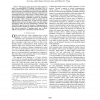Free Online Productivity Tools
i2Speak
i2Symbol
i2OCR
iTex2Img
iWeb2Print
iWeb2Shot
i2Type
iPdf2Split
iPdf2Merge
i2Bopomofo
i2Arabic
i2Style
i2Image
i2PDF
iLatex2Rtf
Sci2ools
101
click to vote
CEC
2008
IEEE
2008
IEEE
Conventionalization of linguistic categories under simple communicative constraints
—The language game approach is widely adopted to study conventionalization of linguistic knowledge. Most of contemporary models concentrate on the dynamics of language games in random or predefined social structures, but neglect the role of communicative constraints. This paper adopts one form of language games, the category game, to discuss whether some simple distance-related communicative constraint may affect the conventionalization of linguistic categories. By comparing the simulation results with those based on another form of language games, the naming game, we point out some essential differences between these two games which cause their distinct performances under the same communicative constraint. This study fills the gap between the dynamics of language games in random structures and that in complex networks, and suggests that internal properties of language games may reversely influence communicative constraints and social structures.
Artificial Intelligence | CEC 2008 | Communicative Constraints | Language Game Approach | Language Games |
Related Content
| Added | 29 May 2010 |
| Updated | 29 May 2010 |
| Type | Conference |
| Year | 2008 |
| Where | CEC |
| Authors | Tao Gong, Andrea Puglisi, Vittorio Loreto, William S.-Y. Wang |
Comments (0)

